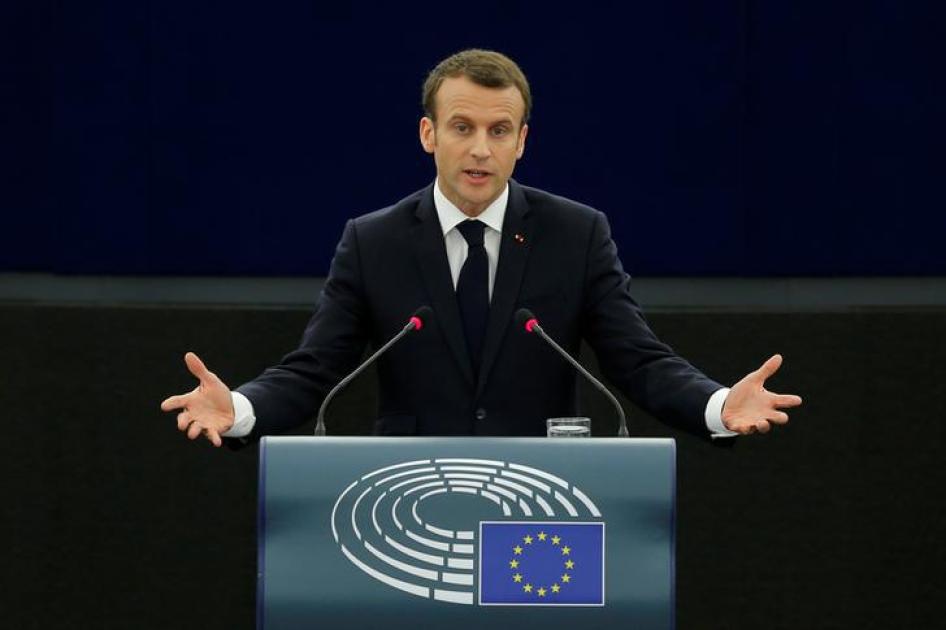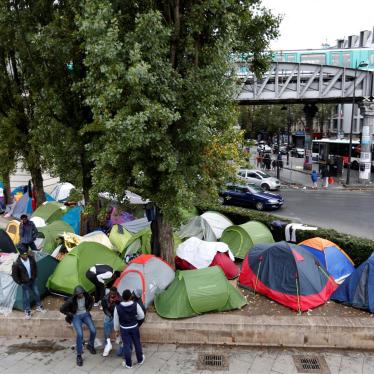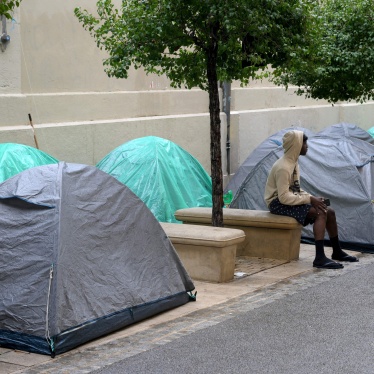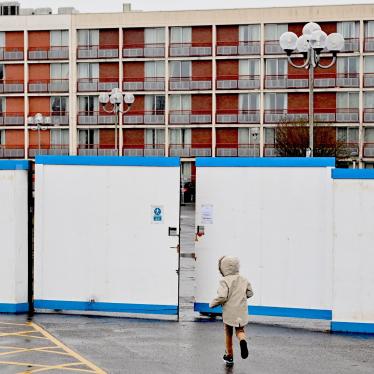Among media analysts and academics, there is a widespread belief that one man, President Emmanuel Macron of France, can stem the tide of radical right populism in Europe. Macron burnished his credentials as the continent’s leading defender of liberal democracy in a major speech at the European Parliament on April 17. His central message was to respond to the populists’ rise not with “authoritarian democracy, but the authority of democracy.”
The challenges are real: Established center-left parties are in decline across the continent, hitting historic lows in elections in the Netherlands last year and polls in Germany in February, and seeing their vote share halved in Italy in March.
The most electorally successful center-right parties, in the Netherlands and Austria for example, seem to be offering a sanitized and politically opportunistic version of radical right populism. These centrists claim to offer a responsible alternative on immigration, yet their rhetoric and politics play on and stoke the same fears about migration and terrorism that the far-right has so skillfully exploited.
By this summer, radical right populists could be in power outright or acting as coalition kingmakers in a contiguous belt across the European Union stretching from Poland in the north, through the Czech Republic, Slovakia, Hungary, and Austria, to Italy in the south. The rise of these parties poses a threat to basic human rights — particularly those that protect vilified minorities — and to democratic institutions themselves.
The May 12 stabbing attack in Paris, now being treated as a terrorism incident, is a reminder that the French authorities have a tough task keeping people safe. Keeping people safe, however, shouldn’t be an excuse for undermining rights.
Democratic governments’ human rights credentials are tested by how they defend seemingly abstract principles like the rule of law and checks and balances in the face of populists’ calls to abandon them in the name of public safety. Macron’s triumph over Marine Le Pen in the May 2017 presidential election appeared to offer a genuine and, above all, popular alternative to xenophobic populists in France and beyond. By labelling Le Pen the “high priestess of fear” in a televised debate, Macron conveyed to the French public that he stood for a different sort of politics.
Macron deserves credit for defending the European Union’s founding values from those EU governments that seem happy to undermine democratic institutions, human rights, and the rule of law. He has publicly criticized the governments of Poland and Hungary for eroding judicial independence and seeking to mute critical voices in society. But if Macron’s defense of European values is to be credible, he needs to ensure that his actions at home uphold those values unequivocally.
One year after Macron’s election victory, his record at home is decidedly mixed when it comes to respect for human rights and key democratic principles. France’s draft migration law, which passed through the National Assembly on April 22, is an example of Macron praising Germany’s progressive refugee policy, but then doing something altogether more draconian at home.
The draft law doubles the maximum period of administrative detention for foreign nationals facing deportation from 45 to 90 days, contrary to a clear recommendation from the official French detention oversight body. In fact, this provision appears to be pure political posturing; data from nongovernmental organizations show that in 2016, deportations were carried out on average after 12 days of detention.
The law permits the detention of children awaiting deportation, despite repeated criticism of France’s record on this issue by the European Court of Human Rights. And it seriously restricts appeal rights for asylum-seekers, while reopening the possibility of deporting people who still have appeals pending, which thankfully has not been possible since 2015.
There has been a minor rebellion within Macron’s own party, En Marche!, with a handful of Parliament members abstaining and defying the party line. But the draft law passed by 228 to 139, with 24 abstentions, and will soon head to the Senate.
This law passed the same weekend that far-right activists launched a publicity stunt in the Alps. They chartered helicopters and sent patrols to stop migrants trying to enter France from Italy through the mountains. Rather than standing up to ill-informed xenophobic vigilantism, the draft law plays into their hands, making their fears seem legitimate.
Macron’s tough line on migration is perhaps epitomized best by Richard Ferrand, his party’s leader in the National Assembly, who exclaimed: “You can’t make an omelet without breaking some eggs. And if some eggs need to be broken, I’ll do it.” The message from the top seems to be: Yes, children may be locked up and some people may be deported unfairly, but this is what getting tough requires.
In the long game against far-right populists, however, this kind of “getting tough” is counterproductive. It legitimizes their grievances, because it treats migrants’ rights as a bargaining chip and abandons long-established principles such as the right to appeal government decisions through the courts.
When it comes to terrorism, Macron’s legislative record is similar. France’s new anti-terrorism law entered into force on Nov. 1, 2017, formally ending the state of emergency that had lasted almost two years after the Paris attacks in November 2015.
During those two years, the normal rule of law was suspended in the name of fighting terrorism, and French security forces responded disproportionately with widespread abuses. They conducted over 4,000 searches, many without warrants, issued more than 700 “assigned residence” orders placing people suspected of terrorism links under house arrest or curfew-like conditions, summarily closed places of worship, and imposed restrictions on peaceful protest. Research by Human Rights Watch and other groups shows that many of those heavy-handed practices targeted and stigmatized Muslim communities.
Although France suspended its commitment to some of the rights enshrined in the European Convention on Human Rights during that period, Macron gave a speech to the European Court of Human Rights on the eve of the new law entering force, assuring his critics that the new law would restore the rule of law. But it hasn’t.
In fact, the new law enshrines in ordinary criminal and administrative law many of the state of emergency’s exceptional powers and practices. It includes extremely vague language allowing local police prefects to order the closure of a place of worship — a power thus far used exclusively against mosques or Muslim prayer groups — and a vaguely worded power to search people without a warrant within a six-mile radius of ports, airports, and international train stations. These measures risk exacerbating existing divisions and mistrust, particularly among already stigmatized Muslim and migrant communities. Human Rights Watch’s research has shown that France’s law enforcement authorities have a longstanding problem with ethnic and racial discrimination in their identity checks, particularly in economically disadvantaged areas.
Shoring up the rule of law against an attack from populists should not entail ripping up the rulebook, or radically rewriting it. Rather than passing laws and policies that undermine rights and exacerbate division, Macron’s government should address the inequalities that help drive support for the National Front’s simplistic solutions.
Odd as it may sound, given all the talk of populists making the most of the people’s distrust of elites, it’s worth paying attention to what the economists at the World Bank have to say. Their report, released in March, recognizes the growing inequality within Europe and calls for greater inclusion of people left behind by technological progress.
Macron has announced some reforms that could address social exclusion and lack of upward mobility, but his plans to tackle poverty and deprivation in the banlieues (France’s primarily working-class and lower-middle-class suburbs), through improved return-to-work schemes for unemployed people, and to shake up France’s creaking social housing system are still in their early stages.
So far, leading anti-poverty and anti-homelessness charities are concerned that Macron’s social policy reforms are taking France in the wrong direction. His government appears to be increasing the pinch on pensioners and others with low incomes. Macron’s government reduced the housing support benefitthat an estimated 10 percent of people in France rely on — a move that is unlikely to convince voters that he wants to improve economic and social rights for all. Macron may also be learning that labeling those left behind by technological progress and those who object to his labor and welfare policy choices as “slackers” does not help his case.
There is also the question of racism, which state statisticians and mainstream French political commentators would prefer to ignore. Nevertheless, the uncomfortable fact remains: Young people from ethnic minority backgrounds experience persistent discrimination at the hands of the police, and their life chances are limited by having the wrong name or growing up in the wrong area. Improving schools and facilitating access to the job market for young people — regardless of race or religion — could help promote social integration in deprived areas and prevent the social division that populists willingly exploit. A recent wide-ranging report into urban deprivation commissioned by Macron late last year and published by veteran politician Jean-Louis Borloo this April paints a devastating picture on youth unemployment, inadequate services, and discrimination in the banlieues. Mayors of these urban areas by and large welcomed its findings, but the government’s response has so far been lukewarm.
Macron’s defeat of Le Pen last year created the potential for a bulwark against radical right populism in Europe. But his “get tough” legislative agenda risks playing directly into the populists’ hands by borrowing from their nativist rhetoric and reactionary policy toolkit to address the very fears they stoke.
If he is to present a real alternative, Macron should first confront some of his own government’s deeply flawed policies on immigration, counterterrorism, and integration. Above all, Macron should stand up for human rights principles and address the fear, abuse, and unfairness that drive voters into the arms of radical right populists.
That pluralist vision is where the authority of democracy lies.











